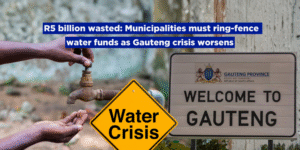On the 27th of February, I, formally wrote to the speaker of Parliament to request for the National Assembly to hold an urgent debate on the economic impact of the Financial Action Task Force (FATF) Grey Listing of South Africa and the steps required to exit the greylist.
We are pleased to note that the Speaker of the National Assembly has acceded to the request for an urgent debate. Being greylisted has placed our nation at significant risk, as the rest of the world now views South African companies and individuals as high-risk counterparties in global transactions. This development is entirely unacceptable, and it is incumbent upon our government to take immediate action to rectify this untenable position.
The South African government continues to bring the South African business sector and its citizens to its knees yet again. Firstly, it was the government’s bungling over electricity, and complicity in the criminal deconstruction of Eskom. Now, by sitting on its hands when it comes to economic crime. To make matters worse President Ramphosa does not seem to understand the magnitude of this catastrophe by commenting that the “The situation is concerning but less dire than some people suggest”. Ramaphosa added “It is noteworthy that the strategic deficiencies identified by the FATF do not relate directly to the country’s financial sector. This means that financial stability and costs of doing business with South Africa will not be seriously impacted by the grey listing.” It is clear that the President is so far removed from reality.
The greylisting of South Africa by the (FATF) is a damning indictment of our criminal justice system and the government’s inability to combat financial crimes such as money laundering and terrorism financing. This situation has arisen primarily due to the inadequacy of our legal framework and the failure of the authorities to prosecute those responsible for such offenses.
This will have significant implications for South Africa’s economy, ranging from less than 1% to 3% reduction in GDP, depending on how quickly we can exit the greylist. Additionally, our reputation will suffer from the negative publicity from the greylisting. This will affect South Africa’s international relationships in many ways, ultimately resulting in a reduced appetite for business relationships with South African associates. The immediate effect of the greylisting is that South African clients will be subject to enhanced due diligence which will increase the costs of doing business for South African companies and individuals trading internationally or holding bank accounts or investment accounts abroad.
We must restore confidence in our financial system and demonstrate to the international community that South Africa is a responsible and trustworthy partner in global trade. The DA will put pressure on government to work closely with financial institutions and the security cluster to fulfil FATF’s remaining recommendations and send a clear message that our country will not act as a conduit for illicit financial activities.
Government must commit to rebuild institutional capacity, processes, and systems in key parts of the supervisory, investigation, and prosecution services. The DA is committed to restoring the integrity of our financial system and strengthening our position as a respected global player. The date of the urgent debate is yet to be communicated and will be finalised by the programming structures of Parliament, where the DA will continue to put pressure for this debate to take place as a matter of urgency.




